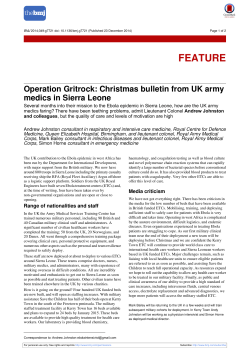
Superadded aspergillosison carcinoid bronchial adenoma
Downloaded from http://pmj.bmj.com/ on January 12, 2015 - Published by group.bmj.com Postgrad Med J (1990) 66, 938 - 939 Missed © The Fellowship of Postgraduate Medicine, 1990 Diagnosis Superadded aspergillosis on carcinoid bronchial adenoma leading to delayed diagnosis Lata Kumar, Meenu Singh, S.K. Mitra and C.K. Bannerjee Postgraduate Institute of Medical Education and Research, Chandigarh-160012, India Summary: A review of aspergillosis in neoplastic disease revealed that most cases occur in association with malignant disorders. Amongst solid tumours it is mostly adenocarcinomas which are invaded by the fungus due to necrotic cavity formation. We here record the first reported association of aspergillosis with a benign carcinoid bronchial adenoma which was hidden by the fungal growth with a delay in diagnosis. Introduction Bronchial adenomas are known to be missed for Precipitins to A. flavus were also negative. Tests. long periods of time.' We report an association of done to study the immune status of the child were aspergillosis over a carcinoid bronchial adenoma in within normal limits. an 11 year old girl leading to an initial diagnosis of Aerosolized amphotericin B, starting with 1 mg/ intrabronchial aspergilloma. kg/day and increasing gradually to 50 mg/day was continued for 3 months along with postural drainage. Haematological profile, renal and liver Case report functions monitored during the therapy remained normal. An 11 year old girl was admitted with complaints of The child responded by expectorating out large recurrent haemoptysis, cough and breathlessness amounts of brownish material which was positive after exertion, of 2 years duration. She had already for the fungus, on smear and culture, becoming received adequate anti-tubercular treatment with sterile 20 days after initiation of treatment. Chest streptomycin, isoniazid and rifampicin from the X-ray done after 2 months showed partial rereferring hospital along with several courses of aeration of the right lung. Bronchoscopy revealed antibiotics and steroids. Serial chest X-rays showed that the velvety vascular appearance was now persistent collapse of right middle and lower lobes. replaced by a glistening white tumour in the right Physical examination revealed a malnourished bronchus near the carina, almost blocking its child with signs of right middle and lower lobar lumen. An attempt at bronchography was not collapse. Other investigations did not reveal any successful. As sleeve resection was not possible, abnormality. A working diagnosis of an intrabron- pneumonectomy was done on the right side. The chial space-occupying lesion, probably a bronchial resected specimen revealed a large well circumadenoma, was made. Bronchoscopy revealed a scribed tumour 2.5 cm in diameter occupying the velvety vascular intrabronchial mass in the right entire right main bronchus with ulceration of bronchus very close to bifurcation of trachea which overlying mucosa. Extensive bronchiectasis was bled with ease. Sputum and the tracheal aspirate present in the right lung. Histopathology of the culture grew Aspergillusflavus. A bronchial biopsy tumour confirmed the diagnosis of carcinoid adenrevealed chronic inflammation and Aspergillus oma. There was glandular differentiation with flavus invading the bronchial tissue. On the tenth mucus production and focal osteoid metaplasia. day of hospitalization she developed erythema There was no evidence of metastasis to the regional multiforme on the face and dorsum of hands. Skin lymph nodes. tests done with purified antigen of A. niger, A. Recovery was uneventful. She is asymptomatic 2 flavus and A. fumigatus, however, failed to react. years and 6 months following surgery. Discussion Correspondence: M. Singh, M.D. Accepted: 24 April 1990 Pulmonary aspergillosis is known to be associated with underlying neoplastic disorders.2 It may occur Downloaded from http://pmj.bmj.com/ on January 12, 2015 - Published by group.bmj.com CARCINOID BRONCHIAL ADENOMA in generalized invasive form in immunosuppressed patients or localized over tumours. Malignant pulmonary tumours due to accompanying necrosis act as a nidus for growth of this fungus.3 In gross appearance aspergillomas may mimic bronchial carcinomas so closely as to lead to the wrong planning of surgical resections.4 A ball-like growth with velvety surface yielding aspergillus on histopathology, as well as culture, initially led us towards the diagnosis of aspergilloma. However, repeat bronchoscopy after the eradication of fungus by aerosolized amphotericin B revealed the underlying encapsulated tumour producing collapse of the right lung. Pneumonectomy, a major 939 resection performed due to strategic location of the tumour near to the carina, was justified due to extensive bronchiectasis in the resected lung. Pseudotumour obstruction of bronchus due to aspergillus in the absence of underlying tumour has been described.5 Allergic reaction to the presence of fungus in the bronchus leads to production of an exudate comprising of mycelium, mucus, fibrin and cellular elements to produce bronchial blockage.4 The over growth of fungal elements in our patient, who was neither immune compromised nor hypersensitive, could have had a similar effect. However, after eradicating the fungus it was found that the obstruction was due largely to the tumour. References 1. Eggleston, P., Golden, G.T., Shannon, M. & Wellons, H.B. Bronchial adenoma in children. Am J. Dis Child 1976, 130: 301-304. 2. Mayer, R.D., Young, L.S., Armstrong, D. & Bessie, Y. Aspergillosis complicating neoplastic disease. Am J Med 1973, 54: 6-15. 3. De Vuyst, P., De Troyer, A., Yernault, J.C., Verhest, A. & Vanderhoeff, P. Aspergilloma in a necrotic bronchial adenocarcinoma. Eur J Resp Dis 1980, 61: 213-217. 4. Hurt, R. Aspergillosis simulating carcinoma. Eur J Resp Dis 1983, 64 (Suppl): 459. 5. Callaud, D. & Molina, C.L. Aspergillose bronchique obstructive pseudotumourale. Presse Med 1987, 16: 174. Downloaded from http://pmj.bmj.com/ on January 12, 2015 - Published by group.bmj.com Superadded aspergillosis on carcinoid bronchial adenoma leading to delayed diagnosis. L. Kumar, M. Singh, S. K. Mitra and C. K. Bannerjee Postgrad Med J 1990 66: 938-939 doi: 10.1136/pgmj.66.781.938 Updated information and services can be found at: http://pmj.bmj.com/content/66/781/938 These include: Email alerting service Receive free email alerts when new articles cite this article. Sign up in the box at the top right corner of the online article. Notes To request permissions go to: http://group.bmj.com/group/rights-licensing/permissions To order reprints go to: http://journals.bmj.com/cgi/reprintform To subscribe to BMJ go to: http://group.bmj.com/subscribe/
© Copyright 2025









